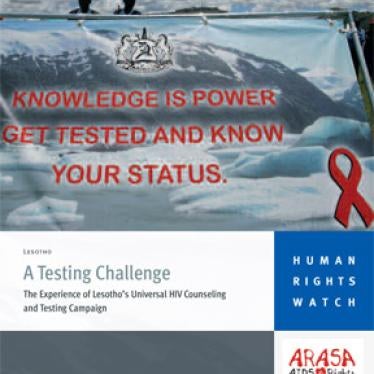(Johannesburg) - Lesotho's drive to test all of its citizens age 12 or older for the virus that causes AIDS fell short of its goals, both in carrying out the program and in safeguarding the rights of those tested, said Human Rights Watch and the AIDS and Rights Alliance for Southern Africa in a new report released today.
The 60-page report, "A Testing Challenge: The Experience of Lesotho's Universal HIV Counseling and Testing Campaign," found that the Know Your Status (KYS) campaign, begun in 2005 with the goal of testing 1.3 million people, was underfunded and had tested only 25,000 people by August 2007, four months before the campaign ended. Ambitious goals to train and pay thousands of lay counselors and expand support groups for people living with HIV were largely sidelined. Supervision of counselors and post-test referrals to HIV prevention or treatment was poorly carried out. The program also took insufficient steps to ensure proper respect for such rights-related requirements as informed consent and confidentiality.
"The administrative failures also meant that the program was unable to adequately safeguard people's rights," said Michaela Clayton of the AIDS and Rights Alliance for Southern Africa (ARASA). "If people trust the program, it increases the number of people who agree to be tested, gets them into treatment and fights the stigma attached to HIV."
Expanding access to HIV testing is critically important to ensure that people living with HIV can get treatment and that others can avoid becoming infected. Lesotho was one of the first countries to implement a mass HIV testing program in communities across the country. Lesotho's program was noble in ambition but weak in action, Human Rights Watch and ARASA said.
"Community-based HIV testing programs have real potential for reaching people who are otherwise unlikely to test," said Joseph Amon, director of the HIV/AIDS and human rights program at Human Rights Watch. "It sounds like a simple approach, but for these programs to be truly successful, they must provide counseling, ensure confidentiality, and link people to HIV prevention and treatment services. If countries fail to incorporate human rights protections, these programs can easily lead to serious abuses."
Human Rights Watch and ARASA conducted dozens of interviews with officials, community-based counselors, health staff and other key informants in Lesotho in October 2007 and February 2008.
The two organizations highlighted five elements needed to ensure an effective, rights-based HIV testing campaign:
- Potential participants should have the opportunity to make a voluntary and informed decision to test. This requires giving them sufficient information about HIV, AIDS, and HIV testing;
- Confidentiality of test results should be protected;
- People who agree to be tested should have meaningful access to follow-up services, including HIV prevention, care and treatment, regardless of the test result, so that they can get the tools and skills needed to protect their health;
- Accountability mechanisms should be put in place to allow governments carrying out the programs to learn of any potential abuses expeditiously and take corrective steps; and
- Laws and policies should be in place to protect people who test positive against discrimination and violence based on their HIV status.
"Human rights protections should be an integral part of any HIV testing campaign," said Amon. "In Lesotho, what we've seen is that the absence of these protections made the campaign less effective."
Human Rights Watch and ARASA noted that similar community-based testing programs are proliferating throughout the region and called upon the World Health Organization (WHO) and the Joint United Nations Program on HIV/AIDS (UNAIDS) to issue guidance to countries on community-based testing. WHO assisted Lesotho in drafting the KYS campaign plan and played a crucial role in incorporating plans for features designed to protect the rights of participants, but it did not ensure that the government actually carried out those protections.
"WHO and UNAIDS should play a leadership role as this new method of expanding testing is implemented," said Clayton. "They need to issue guidelines to countries and be more active in encouraging countries to put human rights safeguards into effect."







